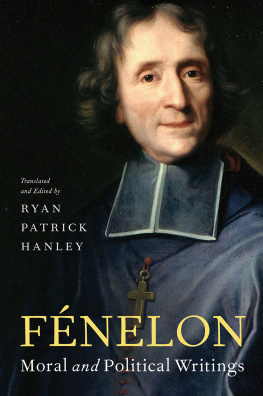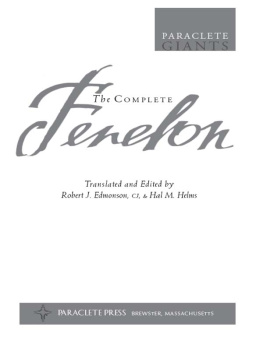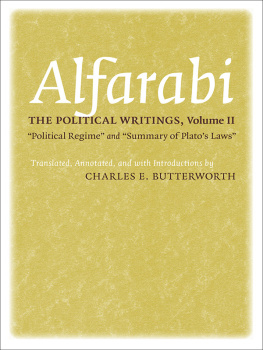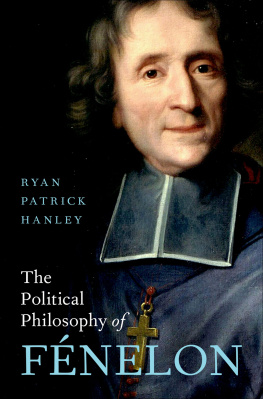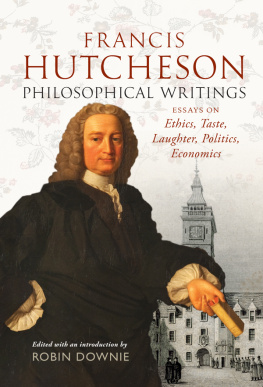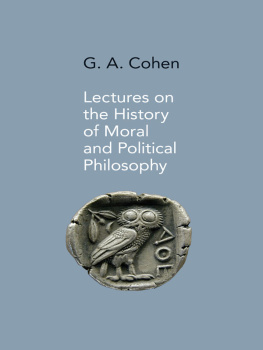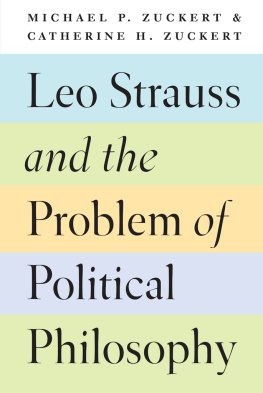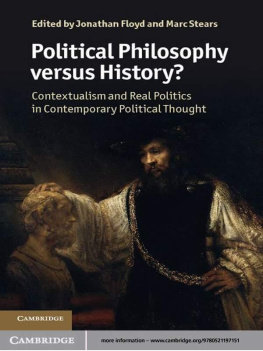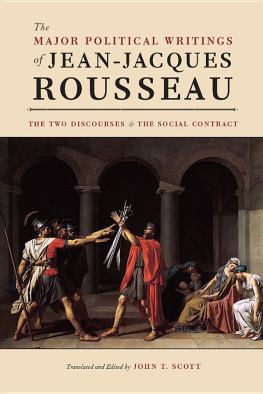Fnelon

Oxford University Press is a department of the University of Oxford. It furthers the Universitys objective of excellence in research, scholarship, and education by publishing worldwide. Oxford is a registered trade mark of Oxford University Press in the UK and certain other countries.
Published in the United States of America by Oxford University Press
198 Madison Avenue, New York, NY 10016, United States of America.
Oxford University Press 2020
All rights reserved. No part of this publication may be reproduced, stored in a retrieval system, or transmitted, in any form or by any means, without the prior permission in writing of Oxford University Press, or as expressly permitted by law, by license, or under terms agreed with the appropriate reproduction rights organization. Inquiries concerning reproduction outside the scope of the above should be sent to the Rights Department, Oxford University Press, at the address above.
You must not circulate this work in any other form and you must impose this same condition on any acquirer.
CIP data is on file at the Library of Congress
ISBN 9780190079598 (pbk.)
ISBN 9780190079581 (hbk.)
ISBN 9780190079611 (epub.)
Contents
I am deeply grateful to a number of institutions and individuals for their support of my work on both this translation and its companion monograph. Fellowships from the National Endowment from the Humanities and the Earhart Foundation made possible invaluable periods of uninterrupted work. The Way-Klingler Fellowship in the Humanities and Social Sciences and the Mellon Distinguished Professorship of Political Science at Marquette University also instrumentally supported my work on several fronts, including my work in the archives. For their helpful assistance with this work I am grateful to the staff of the Manuscripts Department of the Bibliothque nationale de France, and to Agns Jaurguibhre and the staff of the archives of the Compagnie des Prtres de Saint-Sulpice. The Liberty Fund generously hosted a colloquium on Fnelons moral and political thought, which enabled me to receive a great deal of useful feedback on the materials in this volume; I am extremely grateful to Christine Henderson for her efforts at bringing this colloquium to fruition, and to Mark Alznauer, David Carrithers, Aurelian Craiutu, Aymeric DAlton, Eve Grace, Jennifer Herdt, Ourida Mostefai, Adam Potkay, and Kent Wright for many very helpful comments. Several other friends and colleagues read the manuscript in close detail, going well above and beyond ordinary duties of collegiality; for their efforts and their invaluable criticism and suggestions I am deeply indebted to Hank Clark, Charles Griswold, Christine Henderson, Chris Kelly, Catherine Labio, and John Scott. I must also record my debts to the late Patrick Riley for his pioneering work on Fnelon and the authors of his period, and also for suggesting to me, in the course of casual conversation at a 2008 conference in his honor, that an English translation of On Pure Love was especially to be desired. Finally, I am grateful for having been able to benefit from the assistance of several excellent research assistants, including Taylor Ahmed, Will Fitzsimmons, Michael Murillo, Anthony Lanz, Darren Nah and Kaishuo Chen.
| 1651 | Birth of Fnelon (traditional date: August 6) |
| 1654 | Crowning and consecration of Louis XIV |
| 1663 | Fnelon enrolls at the University of Cahors |
| 1669 | Fnelon receives his degree from Cahors |
| 1672 | Start of the Dutch War; not concluded until 1678 |
| 1674 | Fnelon enters seminary of Saint-Sulpice |
| 1677 | Fnelon ordained |
| 1679 | Fnelon installed as head of Nouvelles Catholiques |
| 1681 | French annexation of Strasbourg |
| 1682 | Birth of the Duke of Burgundy |
| October 1685 | Revocation of the Edict of Nantes |
| December 1685 | Fnelon sent to Saintonge as head of mission to Huguenots |
| 1688 | Start of the War of Grand Alliance; not concluded until 1697 |
| 1688 | Fnelon first meets Madame Guyon |
| 1689 | Fnelon appointed tutor to the Duke of Burgundy |
| 1693 | French famine |
| March 1693 | Fnelon elected to the Acadmie franaise |
| Late 1693Early 1694 | Fnelon writes his Letter to Louis XIV |
| 1694 | Inquiry into Madame Guyons writings begins |
| 1695 | Fnelon named Archbishop of Cambrai |
| January 1697 | Publication of Fnelons Maxims of the Saints |
| January 1699 | Fnelon removed from position as royal tutor |
| March 1699 | Pope Innocent XII censures twenty-three propositions of the Maxims |
| April 1699 | Publication of Telemachus |
| 1700 | Duke of Anjou crowned Philip V, King of Spain |
| 1701 | Start of the War of Spanish Succession; not concluded until 1714 |
| 1707 | Fnelon delivers his Discourse for the Elector of Cologne |
| 1708 | French famine |
| 1710 | Fnelon writes his Memorandum on the Deplorable Situation of France |
| Early 1711 | Probable period of composition of the Examination of Conscience |
| April 1711 | Death of Dauphin; Duke of Burgundy becomes heir to throne |
| November 1711 | Gathering at Chaulnes resulting in the Plans of Government |
| February 1712 | Death of Duke of Burgundy |
| March 1712 | Fnelon writes his Memorandum on Measures to Take... |
| 1713 | Papal bull Unigenitus condemns Jansenism |
| 1714 | Fnelon writes his Letter to the Academy |
| January 7, 1715 | Death of Fnelon |
| September 1, 1715 | Death of Louis XIV |
The process of translating Fnelon brought home to me, at nearly every turn, both the vast extent of Fnelons genius and the severe limits of my own. Fnelon is not only a masterful prose stylist but also a sophisticated philosophical writer, one well aware that different methods of presentation are needed to speak to different sorts of audiences. Even as his moral and political writings advance a set of consistent, even systematic, substantive teachings (as I emphasize in my introduction to this volume and my monograph on his political philosophy) Fnelon uses several different voices to convey his teachings in the course of addressing different audiences with different needs. The tutor of the child for whom the Fables and Dialogues were written clearly spoke with a voice very different from that of the spiritual and political counselor of the young man for whom the Examination was written; so too the voice of strident admonishment and urgency that resonates across the Letter to Louis XIV and the Political Memoranda is far removed from the gentler but no less urgent voice of the moral and spiritual advisor on display in the essay on pure love included in this volume.
As translator I have sought at once to do justice to the unity of Fnelons moral and political thought and also allow these different voices to come through and be heard. This goal compelled me to make several choices. In order to preserve and thereby convey the substantive consistency of Fnelons moral and political thought within and across texts, I have tried, so far as possible, consistently to use the same English words for specific French words. But in an effort to preserve and convey Fnelons different voices I have not aspired to a similarly slavish consistency in matters of syntax and punctuation, and have been freer in such matters in texts (like the

